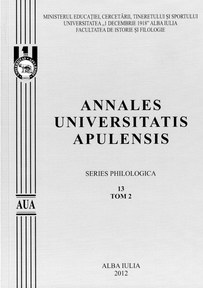Consideraţii metodologice cu privire la studiul reprezentărilor identitare în epoca modernă
Methodological considerations on the study of identity representations in the modern age
Author(s): Mihaela Mehedinti-BeieanSubject(s): Cultural history
Published by: Universitatea »1 Decembrie 1918« Alba Iulia
Keywords: history of mentalities; representations and reciprocal images; cultural history; identity and alterity; imagology
Summary/Abstract: As the surrounding social environment becomes ever more diversified and complex, the individuals’ and also the communities’ typical reaction is to attempt to give meaning to and organise the stimuli with which they constantly come into contact. Such an undertaking involves a correct identification and an accurate comprehension of the most pervasive and representative characteristics of a given group of people, the manifestation of this ability leading to the creation of a coherent set of boundaries between “us” and “them”. The present study deals with precisely this type of relations, both from a theoretical and a methodological perspective. Although it focuses on history and historical writing, the article brings to the reader’s attention and briefly discusses a series of concepts and theories which can be (and sometimes have been) successfully applied in other social sciences as well. For this purpose, I cite the works of a number of renowned historians, such as Paul Ricoeur, Robert Darnton, Peter Burke, Roger Chartier, Michelle Vovelle, Georges Duby or Jean-Pierre Rioux. These authors’ innovative (for their time) and extremely well argumented opinions were thus systematised, summarised and integrated into what was designed as a comprehensive whole, with the purpose of yielding a pertinent approach to studying all sorts of identity related issues. After emphasising a number of cognitive and sometimes emotional phenomena associated with discovering and/or with writing about past events, I also briefly sketch the manner in which various factors impact upon the work of historians. I refer to such concepts as memory and forgetfulness, time and space, or fiction and fictionalisation. These types of influences mostly operate at an implicit level and therefore unconsciously affect the quality and trustworthiness of historical texts. Within this framework and once again making reference to the above mentioned authors, the present article argues that one cannot speak about a mere label modification, but about a qualitative evolution from the history of mentalities to the history of representations and, more recently, to cultural history. Even if the theoretical debates around the use and meaning of these concepts do not allow us to view this transformation as a paradigm shift in the sense defined by Thomas Kuhn, the fact that social sciences have undergone major changes in the last half century is an undeniable truth.
Journal: Annales Universitatis Apulensis. Series Philologica
- Issue Year: 13/2012
- Issue No: 4
- Page Range: 159-184
- Page Count: 26
- Language: Romanian

